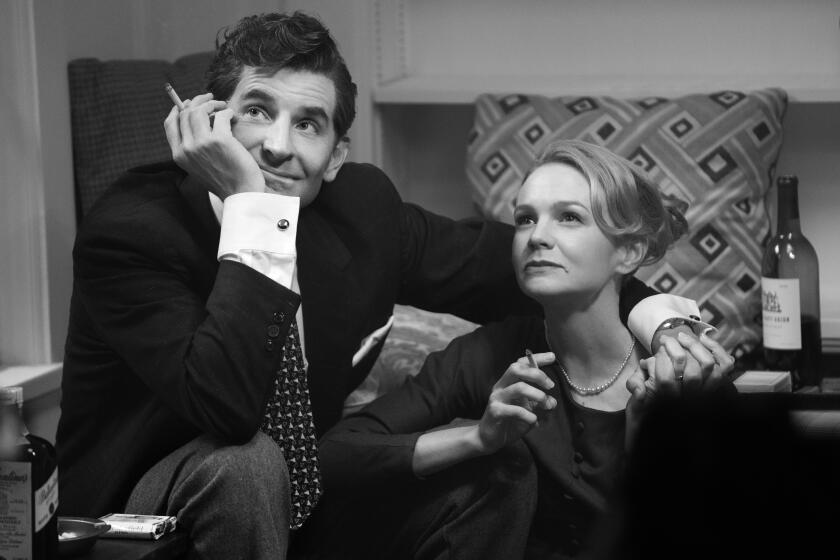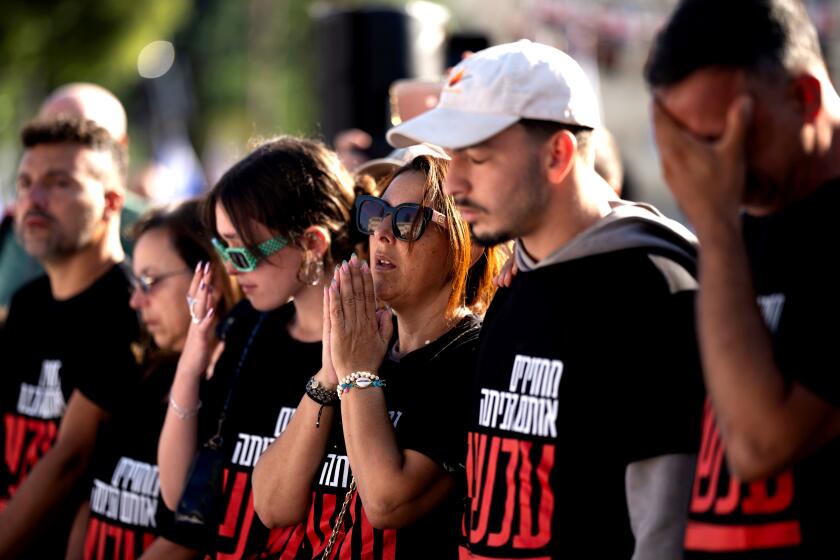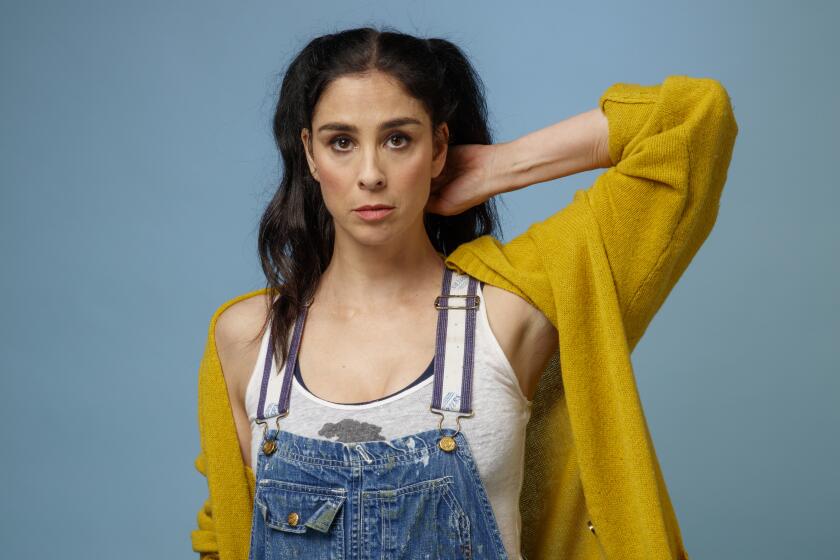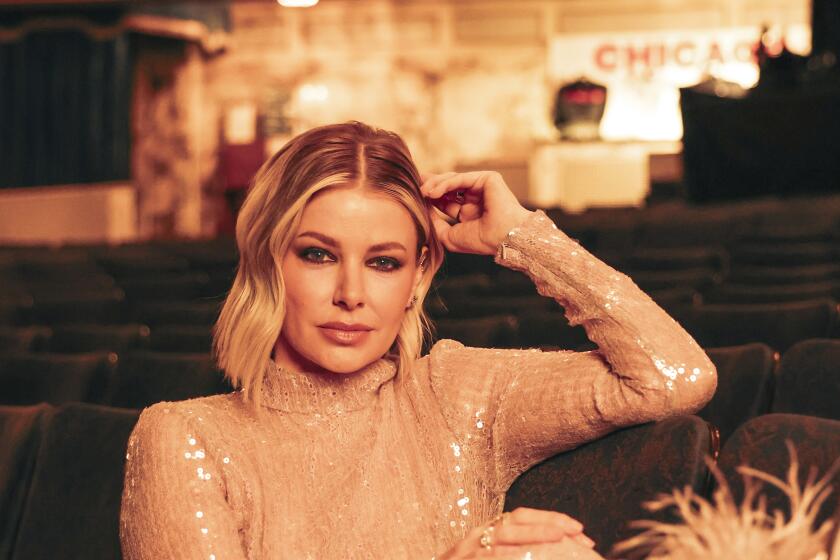
- Share via
To listen to this profile, press the play button below:
In the days after the Oct. 7 attack in Israel, Sarah Silverman posted on Instagram dozens of times. Like millions around the world, she was devastated by the reports of more than 1,200 civilians killed by Hamas militants, and took to social media to express her distress. She shared videos of the festival-goers who were taken hostage, words from activists about antisemitism, a note acknowledging the war had prompted her to start praying.
Then, on the night of Oct. 18, after Israel had announced that the Hamas-controlled Gaza Strip would not receive water and electricity until the hostages were freed, Silverman shared a post from an Israeli food vlogger she did not know that said Israel did not need to provide Gaza with those resources. After which she put down her phone and took her two dogs out for a walk.
Who are the people shaping our culture? In her column, Amy Kaufman examines the lives of icons, underdogs and rising stars to find out — “For Real.”
By the time she returned, her cell was flooded with text messages from friends asking versions of the same question: “What the f— did you just post?”
The comedian says now that she hadn’t read the screed in full before putting it on Instagram, something she insists she never does. She has “no explanation” for why she did it that night.
“I did the worst thing you can do,” she recounts. “I was talking to a friend on Instagram and I said, ‘I feel like people have just completely forgotten that there are hostages.’ They were like, ‘Totally,’ and they sent me whatever it was I posted. And I read just the top line and put it in my stories.”
Back at home, she unleashed her dogs and read the whole post. Realizing how it disregarded the humanity of 2.3 million people who live in Gaza, and denigrated Rep. Alexandria Ocasio-Cortez (D-N.Y.), of whom she’s a fan, she deleted it.
But it was too late. Her manager messaged that she was trending on X, where users were accusing her of being pro-genocide — at the time, 3,800 Palestinians had reportedly been killed by Israel’s military response to the Oct. 7 attack, a death toll that has since risen to more than 13,000. She responded to one person online by saying she’d made a mistake “in the stoned fury of wondering where the hostages are.”
“Because I got high” was not an explanation that appeased her critics. The next day, outlets including Newsweek and the Daily Mail had headlines about Silverman being under fire — putting her at the forefront of a political storm in Hollywood that has resulted in firings, “listening tours” and finger-pointing.

In the span of one week in November, Susan Sarandon was booted by her talent agency and actor Melissa Barrera lost her lead role in the next “Scream” film. In October, a top agent at CAA was demoted. They all had made public comments about Israel’s treatment of Gazans that their employers deemed antisemitic.
Although Silverman’s reputation may have suffered, if only temporarily, she has not lost any work.
But it is rare when a celebrity has a true moment of personal and artistic reckoning. In the month since her fateful post, Silverman says she has been reevaluating her identity as an outspoken comedian and the weight her words carry when she shares them on her very large public platform (X, formerly Twitter: 11.7 million, Instagram: 2 million).
“I know that I speak out about stuff, and that’s a role that I’ve taken on,” she says. “But there’s a balance between that and centering yourself, or thinking that what you have to say is incredibly important.”
And yeah, she was stoned that night. But she says she “usually makes very measured decisions” while stoned. That wasn’t to blame here.
“I f—ed up,” Silverman says. “I try not to define people by their worst moments. But it’s gonna pass, or it won’t. I can’t control it.”
Silverman, 52, is no stranger to backlash. Over the course of her three decades in comedy, she has pissed off a lot of people.
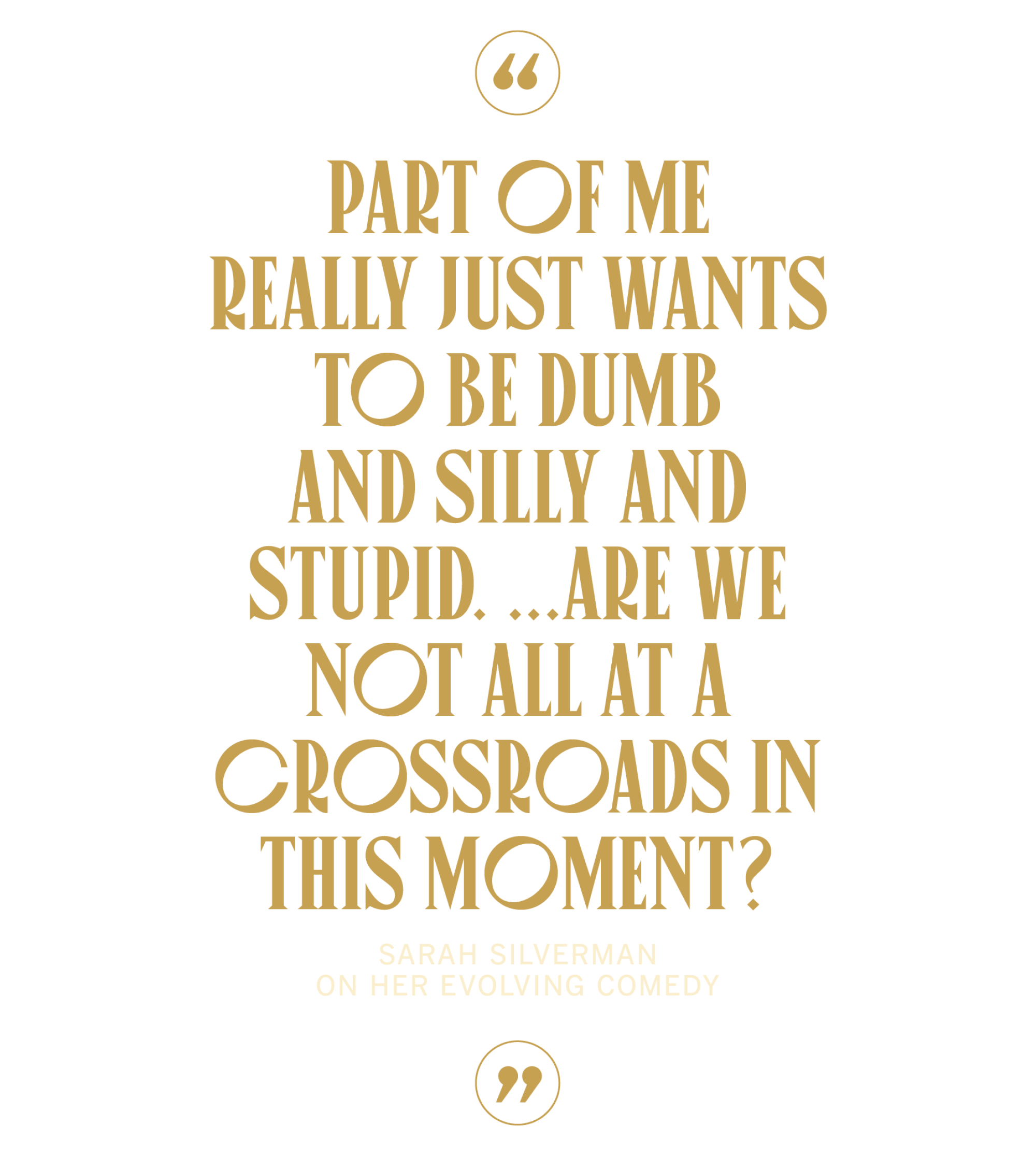
In 2001, she used an ethnic slur for Chinese people while doing a bit on Conan O’Brien’s show, then tried to defend herself during an ill-fated debate with an Asian American advocate on Bill Maher’s “Politically Incorrect.” In 2007, she appeared in blackface during a sketch about racism on “The Sarah Silverman Program.” Comedy Central scrubbed the episode from its platforms, but images from the sketch — which Silverman has since said was a mistake she’s horrified by — live on on social media.
Her career has survived because comedy thrives on shock value, but also because she’s been willing to apologize, repeatedly and sincerely, and acknowledge when her humor has offended or no longer aligns with social mores. Not that she’s afraid to be provocative. She’s unapologetically joked about rape, abortion, the Holocaust.
“She likes to cut a smart thought with edgy humor,” says Jennifer Flanz, the executive producer and showrunner of “The Daily Show.” “To feed the audience an important idea, she uses relatable humor.”
But as the Israel-Hamas war in the Middle East rages on, Silverman says she’s no longer certain how political she wants to be — on stage or online.
“Part of me really just wants to be dumb and silly and stupid and take that really seriously right now,” she says. “I don’t think of myself as a political comedian. Maybe holistically I am. I don’t know. … Are we not all at a crossroads in this moment?”

On a late November afternoon, Silverman is sitting in her living room, a CamelBak water bottle tucked by her side. When I arrive at her house, she announces that she has something she thinks we should do during our interview. I glance at her outfit — an Aviator Nation hoodie, beanie, jeans, athletic slides over socks — trying to ascertain what she might propose. Split a joint or some psilocybin-infused chocolate?
“I thought we could try to drink a lot of water!” she says.
She’s just returned from New York, where she did a weeklong stint guest-hosting “The Daily Show.” One day, the staff stocked her dressing room with three huge bottles of water, and she drank all of them. She felt so good afterward that she vowed to commit to more H₂O intake.
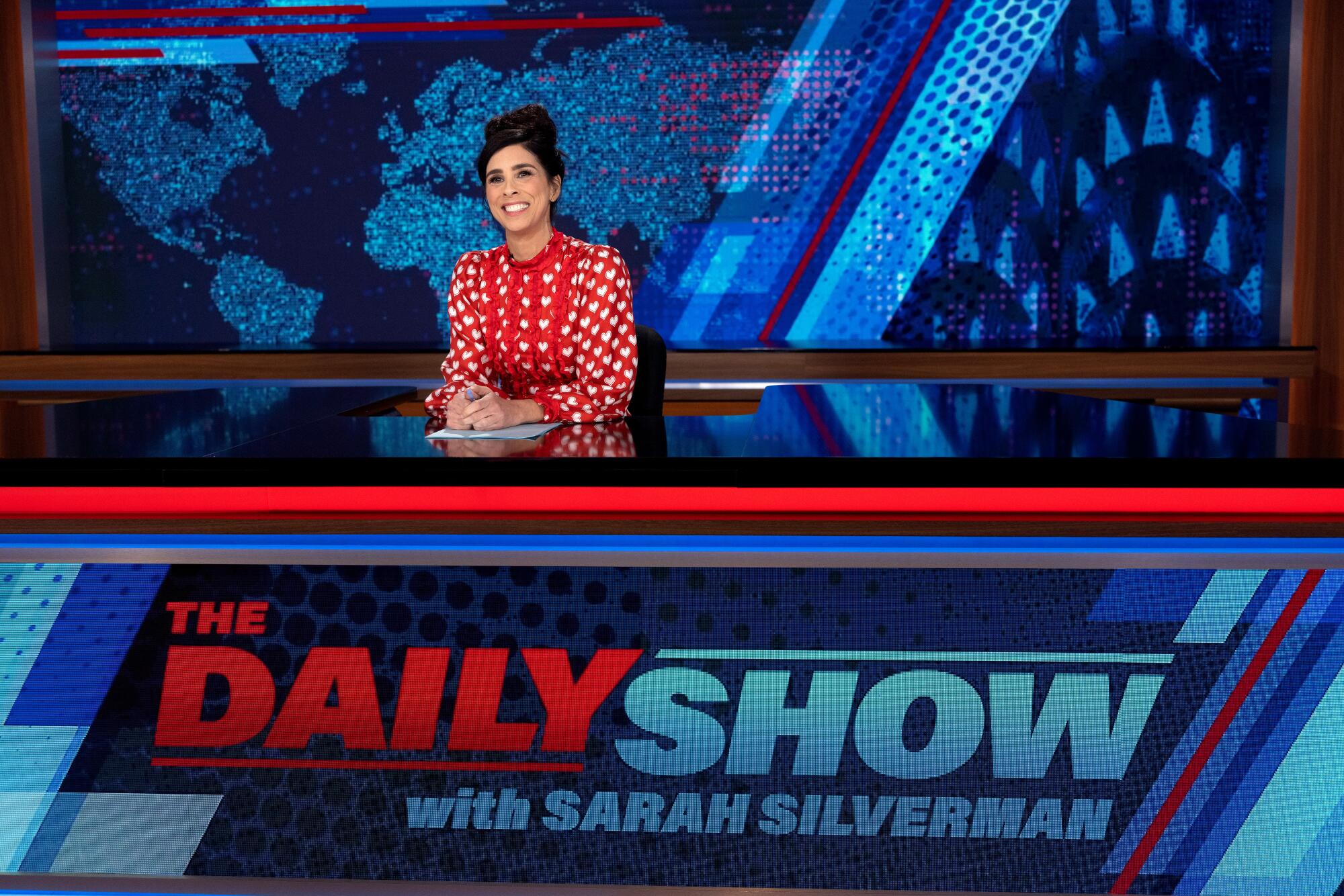
I accept the hydration challenge. It’s not often a celebrity proposes to do an interview in their own home — especially without a publicist hiding in the bathroom. But Silverman isn’t guarded about her private life, nor trying to hide in a moment when many other stars might just wait for the news cycle to move on. She seems willing not just to own her mistake, but also to acknowledge and grapple with the evolving landscape in which it occurred.
Her dogs — a small one (Mary) and a big one (Sibby, short for Sibling) — have followed us over to the couch, where Silverman rolls a pet-hair remover over the cushions before we sit.
The entire home is modern, a big box that, inhabited by anyone else, might feel devoid of character. But she’s Sarah-fied it: There are labels stuck on some of the kitchen cabinets, like “panini press.” Her living room is covered with bold floral wallpaper, and a picture of her father and stepmother — who died within 10 days of each other in May — is propped against a wall under the TV.
Silverman’s boyfriend, with whom she shares her home, asked recently if she wanted to move the foam-board photo from their funeral to a more permanent location. She told him she just wanted to leave it there for a while.


The comedian has been dating Rory Albanese, formerly the showrunner of “The Daily Show With Jon Stewart,” for about three years. Albanese is now a writer for “Jimmy Kimmel Live!” so he’s out of the house for a lot of the day. Silverman fills her schedule with what she calls “odd jobs” — recording her call-in show “The Sarah Silverman Podcast,” doing stand-up, and taking occasional acting roles.
Including one in “Maestro,” the Leonard Bernstein biopic directed by and starring Bradley Cooper that, before the Hamas attack, was the center of its own controversy. Cooper, who is not Jewish, wore a prosthetic nose in the film to more closely resemble Bernstein, a choice that some critics have deemed “Jewface.”
In his second directing effort (after “A Star Is Born”), Bradley Cooper plays the conductor opposite Carey Mulligan as his wife, actor Felicia Montealegre.
Silverman plays the composer’s beloved and vivacious sister, Shirley, a part she won after auditioning with a nine-page monologue that was initially in the script.
“It was a much bigger part” at first, Silverman says, noting that a rewrite left her character in only two scenes. “Bradley called me to talk about it and obviously I was bummed, but I was like, ‘I understand that this isn’t the Shirley Bernstein project.’”
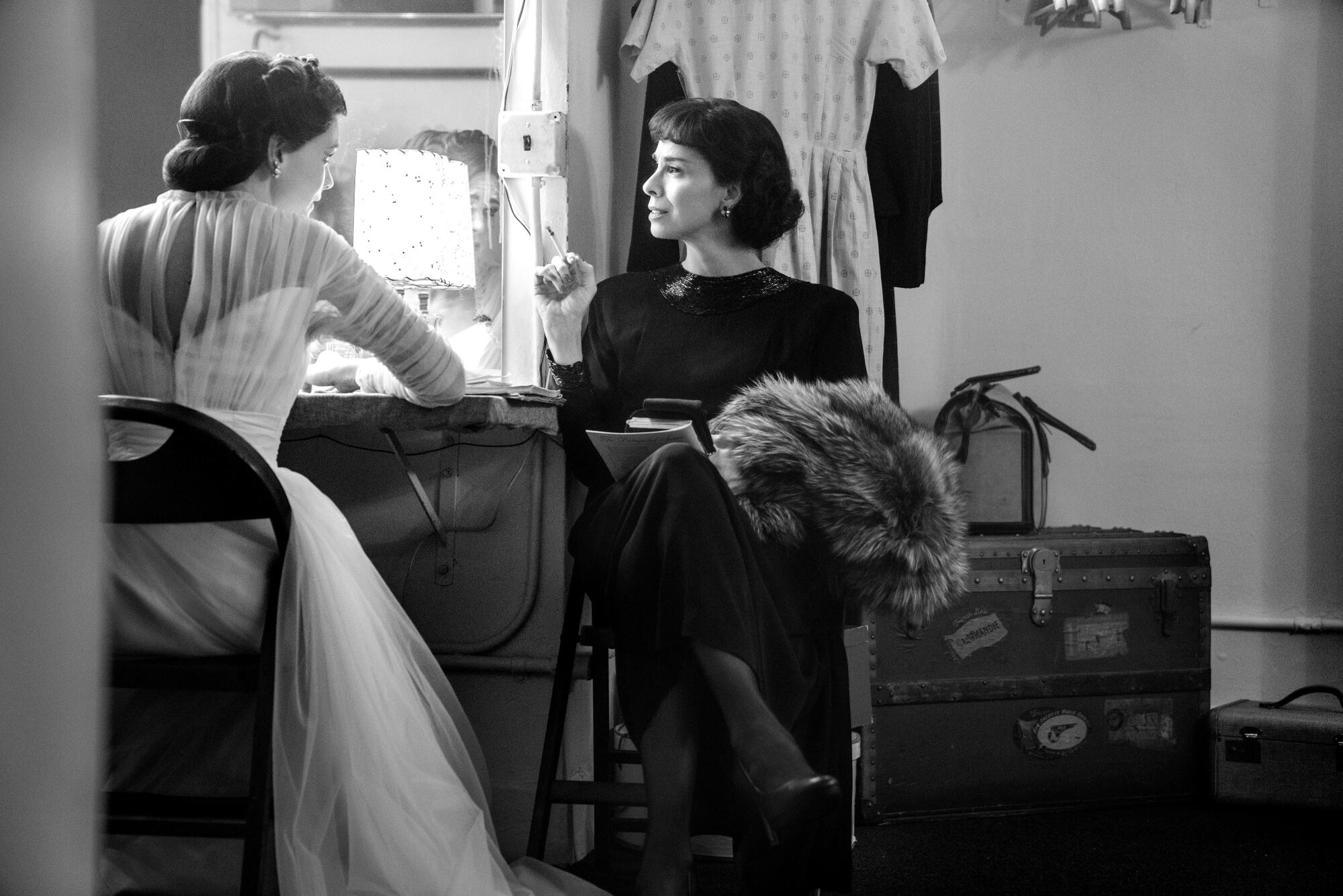
Ironically, Silverman was one of the first prominent Hollywood figures to address the issue of non-Jewish actors playing Jewish characters; in a 2021 episode of her podcast, she pointed to the casting of Felicity Jones in a film about Ruth Bader Ginsburg and Rachel Brosnahan in “The Marvelous Mrs. Maisel.”
She regrets that the remarks from her podcast have been boiled down to “only Jews should play Jews.” Her intention, she explains, was for her listeners to notice that in a time when representation in art is gaining renewed focus, “it doesn’t seem to bother anyone [in the case of] this particular minority.”
“I’m not trying to make a rule about it,” she says. “I love my career, and I have no regrets or bitterness. But it’s very interesting that for the bulk of my career, many Jewish actresses — and everyone will point to Natalie Portman and Gal Gadot, because they’re gorgeous and brilliant — but we usually play the friend. The exposition or the sassy ... agent.”
“Playing someone who deserved love,” she adds, “was certainly not anything that was really available to me.”
With “Maestro,” the fact that Cooper is not Jewish did cross her mind. But the film was being made in cooperation with Bernstein’s family and produced by Steven Spielberg, which gave her some solace. “Also,” she says, a tad incredulously, “am I supposed to say no to being able to play a real-life Jewish woman?”
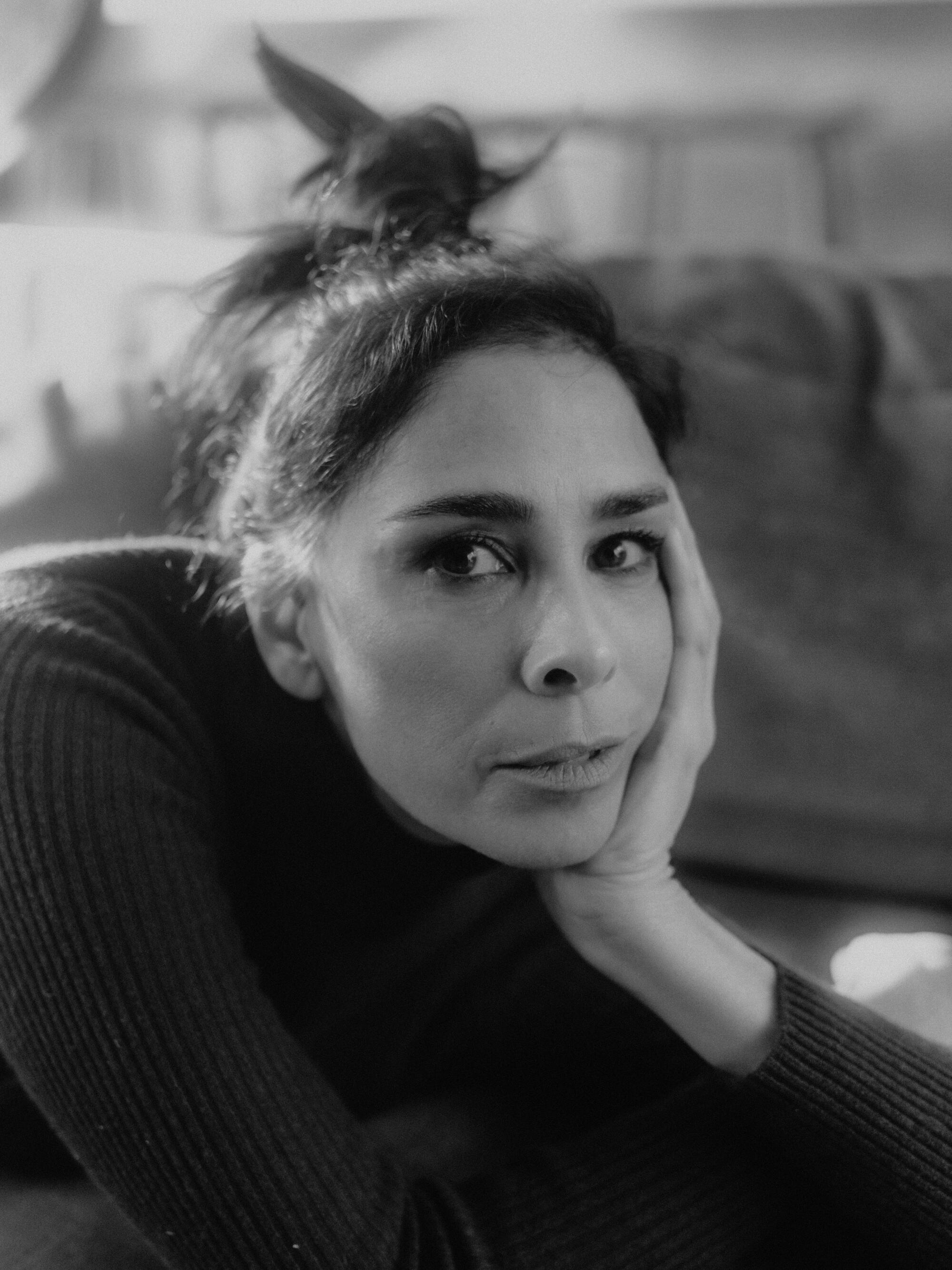
When the first pictures emerged of Cooper as Bernstein — Silverman calls it “Nose Day” — she says her publicist was bombarded with requests to “talk to the Jew face girl about this.” None of those inquiring even realized she was in the film with him, she says.
As for the prosthetic, she doesn’t see any malice in it and points to the actor’s immersive process in physically transforming himself with dental implants, wigs and costumes. After her first day of shooting wrapped on “Maestro,” Silverman actually called her manager pleased, sharing that she didn’t think Cooper had altered his nose. “Because I was nervous about it,” she admits. “I honestly did not think he was wearing a fake nose, so I was like, relieved.”
Since the Israel-Hamas war erupted, however, she has “pretty much made a 180” on her feelings about the issue. “If non-Jews want to tell and illuminate Jewish stories, uh, great. Thank you. The world has changed overnight. This is not an issue for me.”
When did Silverman become a de facto Hollywood spokesperson for Jews? She isn’t sure, and the thing is, she doesn’t even consider herself particularly Jewish.
Growing up in New Hampshire, her atheist parents raised her and her three sisters without religion. They were extremely liberal — her mother had a white convertible with a license plate that said “NOWAR” and was painted with peace signs and flowers. Silverman’s father owned an outlet store that sold discount fashion, and he often kept the heat on in the vestibule during the winter so unhoused people could get warm.
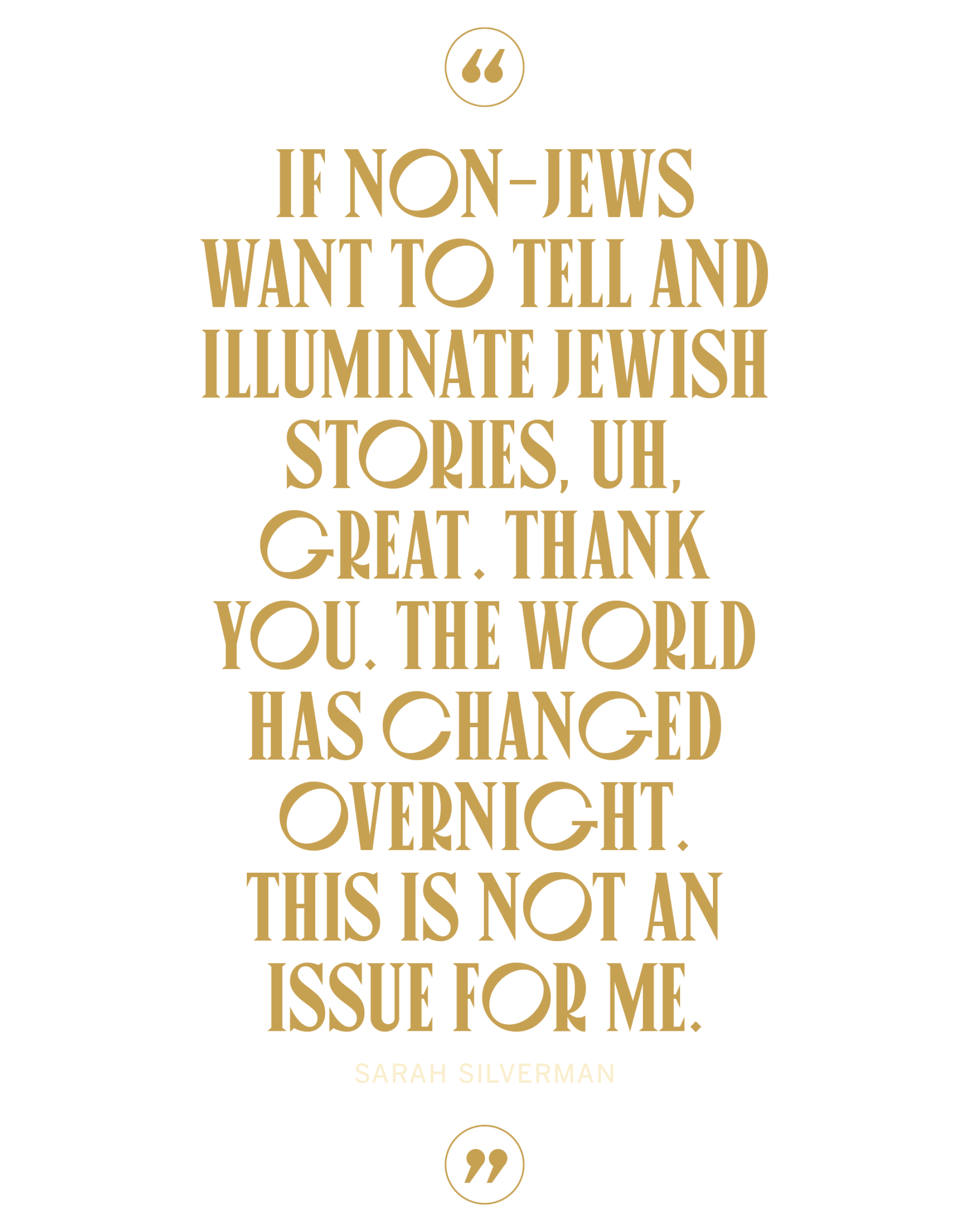
Silverman’s eldest sister, Susan, practiced Judaism early, becoming a rabbi and eventually moving to Jerusalem in 2006. While Susan was in rabbinical school in New York City, Sarah was getting her start on “Saturday Night Live,” and they’d host a weekly dinner mixing their friend groups of young students and comedians.
But it’s only in recent years that Sarah has embraced Judaism more fully, after Susan says Sarah read David Baddiel’s 2021 book “Jews Don’t Count.”
“It’s gone from something that’s unspoken to more of her identity of who she is in the world,” says Susan, 60. “When I’m home with my family, I’ve never pushed the Jewish stuff, like Shabbat or being kosher. So when Sarah started talking about it and noticing stuff, I was very happy to engage in those conversations.”
Unlike many American Jews, Sarah says, she feels no spiritual ties to Israel, which she has visited twice. “People are like, ‘You’re going to go there and feel so moved!’ ” Sarah says. “I don’t. I feel no connection to it.”
But since Oct. 7, she says, “every Jew in America is feeling frightened right now.”
After the attack, Silverman was glued to her phone, checking in constantly on Susan and her family. Her sister has five kids, one of whom is serving in the Israeli army.
Susan, meanwhile, was keeping tabs on the vitriol aimed at Sarah, even getting into a back-and-forth with someone attacking her online. “It’s infuriating,” Susan says. “There’s this glee in identifying what someone’s done wrong and acting like their faults are set in stone. Sarah’s whole thing, which is so brilliant, is ‘people grow.’ ”
Since the negative reaction to her Instagram repost, the comedian has scaled back on sharing her opinions about the violence in the Middle East. The other day, Silverman recorded an episode of her podcast all about the war — only to cut it at the last minute and replace it with discussion of her theory that “there’s probably way more prolapsed anuses since the advent of the smartphone.”
She thinks there’s a part of us — in conversation she references me, a Jewish woman, as she says this — that hears the echo of that famous Martin Niemoller confession: “Then they came for the Jews, and I did not speak out…”
So she still wants to say something, but at the moment, she’s doing her best to quell her urge to share her opinions publicly.
“I don’t have to weigh in. This does not have to be my job,” she says. “There are f—ing scholars. It’s insane how everyone is an expert on this region now. I don’t know how to solve this, but by the way, neither do you. Stop.”
Celebrities certainly are entitled to wade into the current crisis on Instagram and X. Whether it’s in any way productive is another matter.
Taking a step away from social media has been great, she says. Will she stick with it? Unclear. “I make no promises. I don’t know who I am tomorrow,” she says.
We haven’t even really stuck with this whole water challenge — I never get beyond one glass, and her water bottle is never refilled.
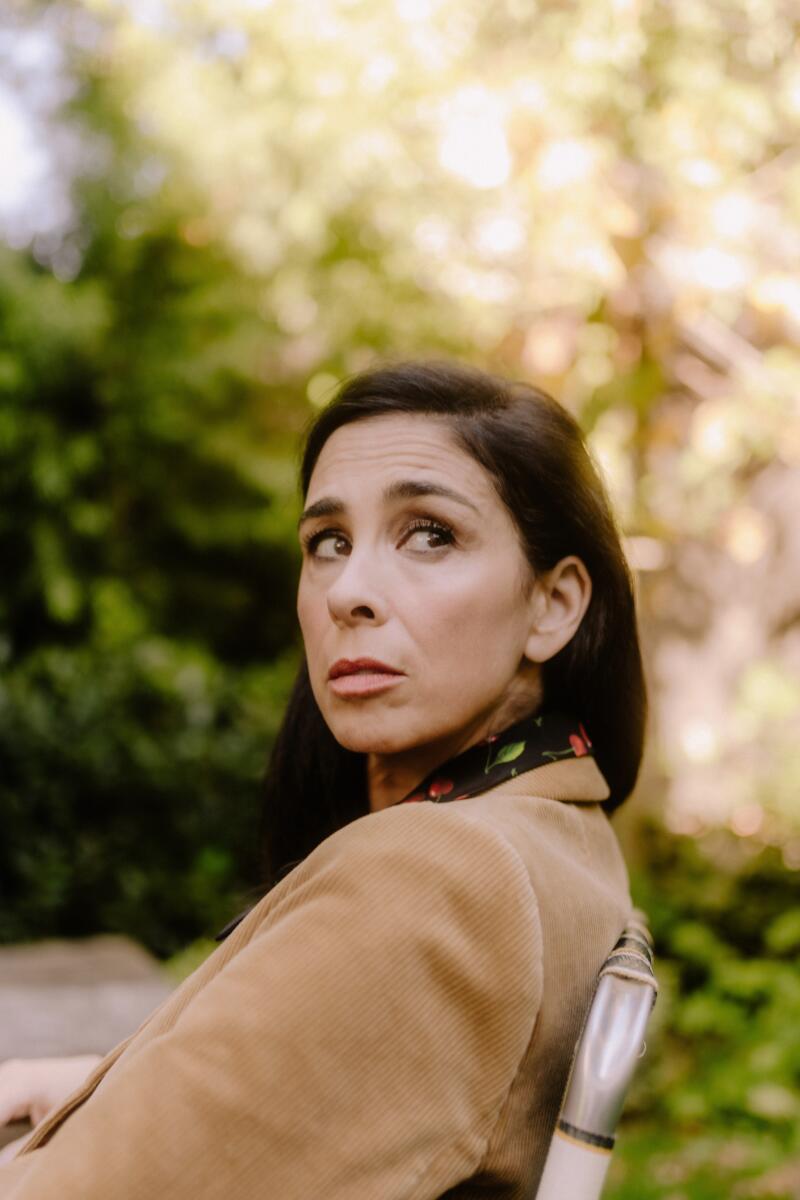

Keeping her politics to herself has helped, but it has also left her frustrated. She’s heartbroken that she’s too afraid to post a video of Broadway stars singing “Bring Him Home” in tribute to the Israeli hostages.
What she’s scared of, specifically, is hard for her to name; she tries answers out loud before cutting herself off each time.
“I don’t know why I’m afraid,” she says, finally. “I don’t want to sully it with people who are looking to — I mean, I don’t look at the comments. People tell me, ‘God, they’re just murdering you. I’m so sorry.’ I’m like, ‘Oh no, how bad is it?’ Because I’m just protecting myself from it.”
For all her professional bravado, among those closest to her, Silverman is known as a sentimental softy. You can see it in her home — an old Christmas card from Garry Shandling on the mantel, a pot of Mexican mint snipped from a plant her neighbor Jack McBrayer has kept going since college.
Last year, the New York Times went as far as to say she’d become the “unlikely moral center of the comedy community: a Gen X Mr. Rogers.”
Rogers is one of Silverman’s heroes — she thinks he had the right worldview, that we should all be taking care of one another.
She also likes a joke told by the comedian Neal Brennan about people going up to LeBron James and asking him: “Is this you when you were 14? You were only 5-6!” “Yeah,” James replies, “but I grew.”
“I feel like lighting someone up or canceling them and giving them no path to redemption — who are you? Who does that make the mob?” she says.
She has put that worldview into action in recent years, remaining friends with comedian Louis C.K. after he was accused of sexual misconduct in 2017.
“I just know that you can love someone who f— up or did bad things,” she says, after I ask about the state of her friendship with C.K., whom she described as one of her closest buddies in her 2010 memoir, “The Bedwetter.”
It’s the only time over the course of our three-hour conversation that she grows upset. “Is this something we have to talk about?” she asks. “I still have to answer for Louis? It ruined, like, two years of my life. I couldn’t promote anything that I did.”
She’s willing to answer for her own errors in judgment — but his? She’s not responsible for those.
Silverman says she hasn’t fallen out with many friends in her life. She tries to foster a sense of community with other comics, especially young ones like Hannah Einbinder, Robby Hoffman, Beth Stelling; this summer, after picketing during the WGA strike, she’d invite her peers over to swim and smoke pot.
Sarah Silverman, host of the Emmy-nominated variety sketch series “I Love You, America,” calls “cancel culture” a “mutated” form of McCarthyism.
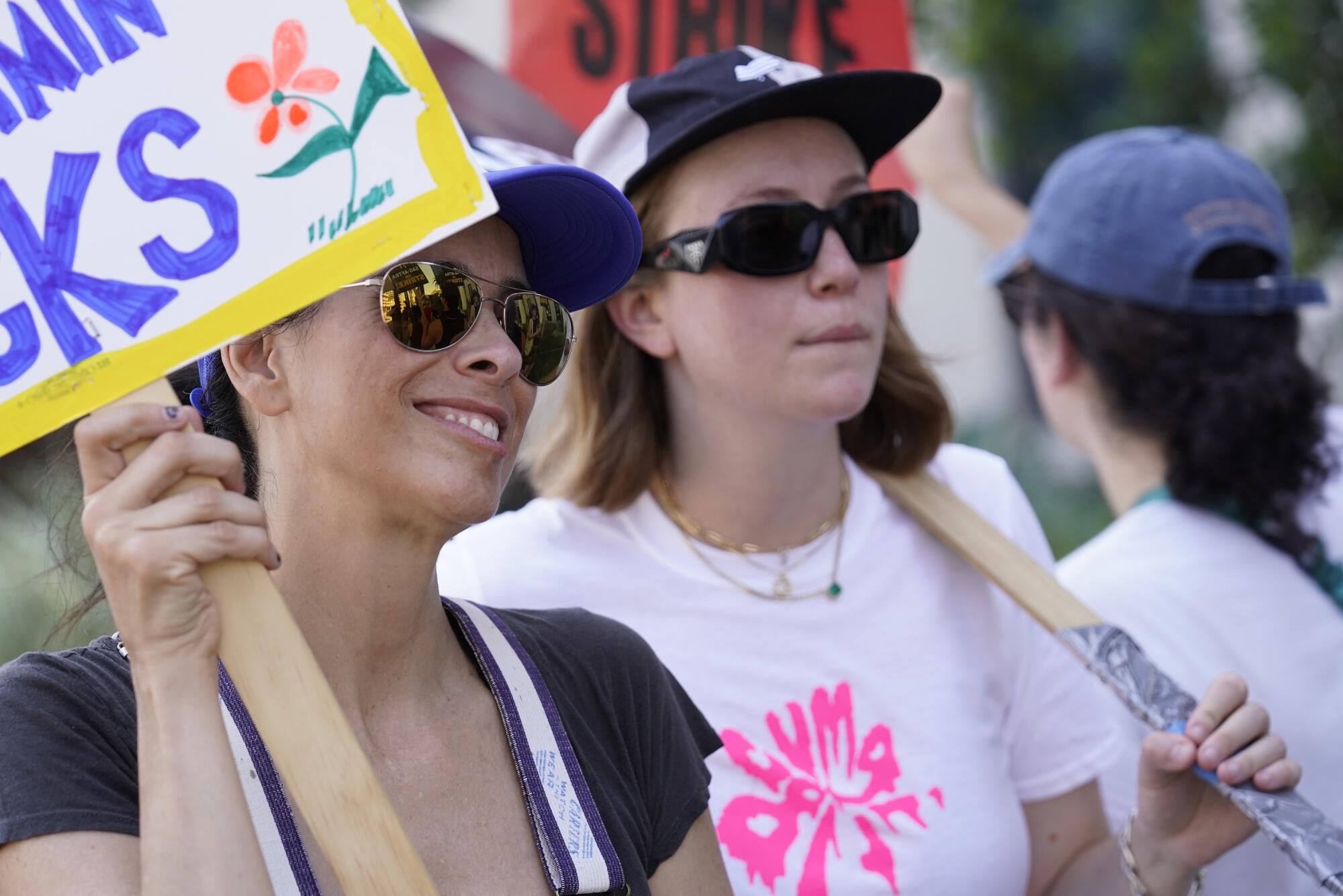

Comedians are her people — part of why stand-up is always where she lands. She loves acting, but can’t imagine signing onto a series indefinitely that would take her away from comedy. (She did roughly 14 days on “Maestro.”)
Though she’s had a number of serious turns in dramas over the years, including Showtime’s “Masters of Sex” and the Billie Jean King film “Battle of the Sexes,” she still encounters resistance from people in the industry who think her off-screen persona is distracting to viewers.
“Some people aren’t interested in me as an actor because they feel like no one could get lost in something that I was in,” she says. “But I don’t think that’s true — I think I’m capable of disappearing into roles. No one knows Leonardo DiCaprio, other than he dates models and you see him on a yacht — he doesn’t do, like, wacky games on Jimmy Fallon or whatever. And I think that helps him disappear. I understand that I’m a comedian and I’m outspoken and the other parts of my life are very personality-based, like ‘The Daily Show’ hosting.”
She’s served as a guest host on “The Daily Show” twice this year. During the most recent stretch this month, Flanz says she noticed Silverman feeding off of the energy of the in-studio audience. Meanwhile, online, the reception was less welcoming.
“My concern that week was just making sure she felt comfortable and safe,” says Flanz, who has been with the program for 27 years. “She needed to perform every night, so seeing comments and harsh things about yourself and then having to go out and make people laugh isn’t easy. Part of my job was to remind her that the audience coming to see her was friendly — and that she was brave.”
Even if Silverman could have “The Daily Show” gig full time, she wouldn’t want it. “I don’t think that it’s for me — that it’s tenable to do with the kind of odd jobs I like,” she says.
She does feel for Hasan Minhaj, who reportedly lost the vacant Comedy Central job after a September article in the New Yorker alleged that in his act he’d significantly embellished personal stories about racism he had endured. Six weeks after the story was published, Minhaj released a 21-minute video addressing the supposed fabrications.
Hasan Minhaj gave his own scandal with the New Yorker the ‘Patriot Act’ treatment. He shared the emails and conversations that went into the ‘emotional truth’ story.
“And when I listened to that … it definitely made me feel like, ‘Wow, they were out to get him.’”
In her own comedy, Silverman tries to make it extremely clear when something isn’t true, though she makes small alterations to smooth out her storytelling. In her May HBO special, “Somebody You Love,” she made a joke about seeing a sign at a pool that forbade anyone from entering who’d had diarrhea in the last two weeks. “I mean, just say it: No Jews allowed.”
In the bit, she was at a ritzy Hawaiian resort — in reality, she was just down the street at the Sunset Marquis.
Right after Oct. 7, Silverman says she couldn’t imagine going on stage. In the week before her incendiary post, she started canceling gigs, worried she’d “go on stage and see people’s sweet faces and just start sobbing.”

It was Chelsea Handler who shook her out of her depression. Handler had two nights booked at the Hollywood Pantages Theatre and asked Silverman to do a guest spot during the shows.
“I said: ‘Get your ass down here. This is what we do for a living,’ ” Handler says she told Silverman. “It’s our responsibility to be mood lifters. … This is a huge opportunity for all comedians to really dig deep and lift others up.”
And Silverman did feel better after the sets. She could tell how much the audience needed to laugh — how much she did too. As with the water, it’s easy to forget how good it is for her.
“My head isn’t there right now,” she says, “but that’s where I want it to be.”
More to Read
The biggest entertainment stories
Get our big stories about Hollywood, film, television, music, arts, culture and more right in your inbox as soon as they publish.
You may occasionally receive promotional content from the Los Angeles Times.


